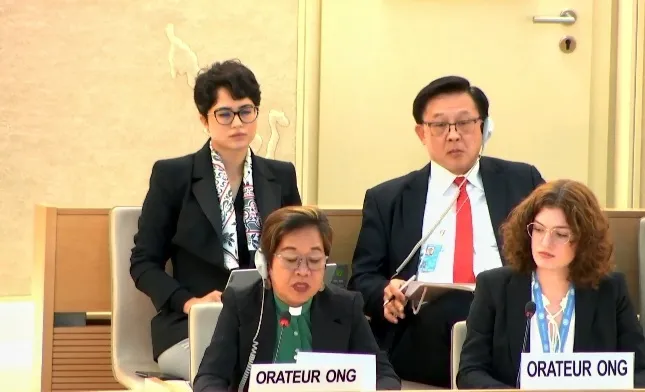The Anti-Terrorism Act (ATA) of 2020 has resulted in harassment and the filing of trumped-up charges against human rights defenders.
This is the testimony of Rev. Glofie Baluntong in an oral statement delivered during the 55th session of the United Nations Human Rights Council (UNHRC) in Geneva, Switzerland.
Baluntong, a former United Methodist Church District Superintendent in Mindoro, delivered the statement at the UNHRC’s interactive dialogues on the report of the Special Rapporteur on the promotion and protection of human rights and fundamental freedoms while countering terrorism last Tuesday, March 12.
Baluntong narrated the harassment she endured and how her humanitarian work has led to the filing of trumped-up charges against her under the ATA in 2021.
It was on June 17, 2019, when the police barged into her church compound in Roxas, Oriental Mindoro without a court-issued warrant. The police demanded that Baluntong present the members of Karapatan Southern Tagalog whom she was hosting. It is for this incident that she was accused of aiding alleged rebels.
Since then, Baluntong said, she “has endured harassment, intrusive visits, and questioning by the Armed Forces of the Philippines.”
Prior to the ATA charges, she was also slapped with attempted murder charges on August 18, 2021.
“[They cited] an armed encounter that allegedly occurred on March 25 of that year—a day on which I was conducting funeral rites for a departed church member,” Baluntong told the UN.
“I was also wrongfully charged with [violation of] the Anti-Terrorism Act of 2020, and grave threats from state forces have forced me to flee my town,” she added.
Human rights group Karapatan, said there are at least 91 individuals who have been charged with violations of the ATA and Republic Act No. 10168 or the law on the prevention and suppression of terrorist financing. There are also at least 27 political prisoners charged under both laws.
“Charges under ATA against three political prisoners had been dismissed, but they remain in jail due to other trumped-up criminal charges. Eight political prisoners who were detained and faced charges under Republic Act No. 11479 have been released,” Karapatan Legal Counsel Ma. Sol Taule said in a statement.
The constitutionality of the ATA was contested through several petitions before the Supreme Court. But even with the strong opposition from many groups, the law was declared constitutional by the high court except for two provisions.
‘Counter-terrorism measures in many states violate human rights’
During the UNHRC, the recently appointed UN Special Rapporteur on the promotion and protection of human rights while countering terrorism Ben Saul also submitted his first report discussing how counter-terrorism measures violate human rights.
Saul condemned what he described as “rampant weaponization of overly-broad terrorism offenses against civil society, including political opponents, activists, human rights defenders, journalists, minorities, and students. Unjustified and protracted states of emergency continue to undermine human rights.”
Saul also said, “Excessive military violence in response to terrorism also destroys fundamental rights, including through violations of international humanitarian law and international criminal law.”
“Cross-border military violence is increasingly used by states even when it is not justified under the international law of self-defense,” he added.
He also added that many states have also failed to address the root causes of terrorism, including state violations of human rights – “while impunity for those violations is endemic.”
Saul also said that the UN has been part of the problem, “by encouraging authoritarian regimes to strengthen counter-terrorism laws in the absence of a rule of law culture or human rights safeguards.”
“The UN must also do better to meaningfully consult civil society on counter-terrorism,” he said.
In his report, Saul said, “States must ensure that their counter-terrorism laws and practices, including on countering the financing of terrorism, do not limit the activities of civil society organizations, civic space or humanitarian action in any manner that is unlawful, unnecessary, disproportionate or discriminatory.”
With this, Baluntong said that on behalf of the World Council of Churches, they call upon UN member states, including the Philippines, to heed the recommendations of Saul to ensure that counter-terrorism laws and practices, including efforts to combat terrorism financing, respect human rights.
“Saul’s report testifies to my own lived experience,” Baluntong said.
Baluntong is with the delegation of the Philippine Universal Periodic Review in Geneva attending the ongoing UNHRC session.









